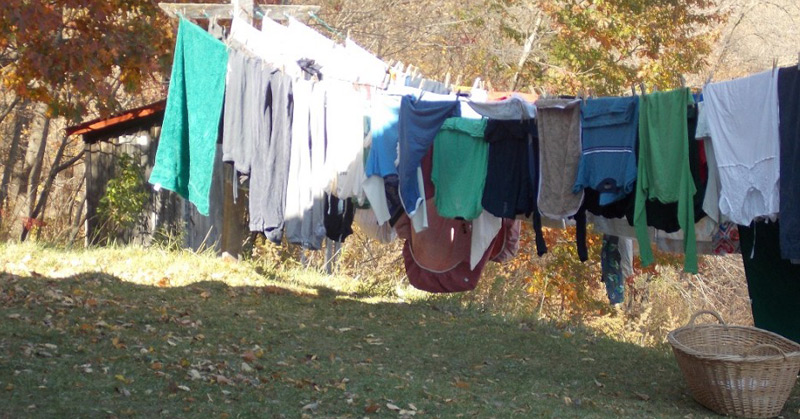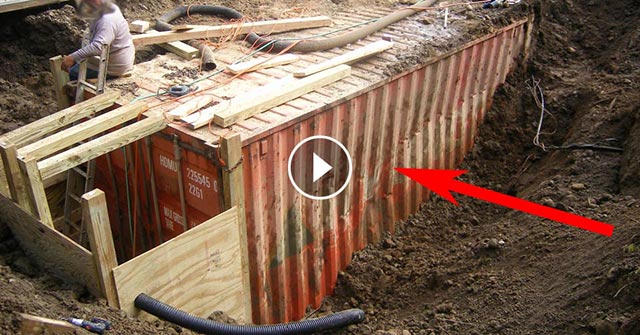Click Here To Join Our Telegram Channel for FREE daily tutorials!

I thought it might be a good survival exercise to try doing laundry without using the washing machine and dryer. Whenever there is a hurricane approaching one of the preparation chores that I do (in addition to making sure there is enough water, food, and supplies for several days) is to do the laundry while power is available. Ideally, you’d already have clean clothes available, but what if there is an extended power outage?
I saved a few pieces of clothing, some socks and a large towel to do the experiment.
Washing

I piled the clothes in the bathroom sink. For clothes washing, I tried using a Mobile Washer sample that I received.. It was easy to assemble. The washer looks like a plunger, but without the rubbery plunger smell.

The instructions simply say add soap and 4-6 inches of water and agitate the clothes using up and down motion. I used my homemade laundry detergent added to some water.

The socks were stained but I did not use bleach, as I wanted to keep the experiment as simple as possible.
Although the Mobile Washer instructions say you will feel a pulling action while the clothes are agitating, I did not really feel that the up and down motion was doing anything. Perhaps the clothes had to be level to the ground or bathtub for this to work, as using it on a bathroom sink level felt unwieldy to me. I wish I had a better result to report to you, but I always write the truth in these experiments regardless of expectations.
I contacted Mobile Washer after the experiment about my less than stellar results and got a quick response, which actually addresses what happened:
“The best way to get this action on the clothes is to make sure you have enough water so the clothes float freely, have a deep enough container (sink, bucket, tub etc) so that you can get some good plunging action without splashing the water out of the container. When these steps are followed, the washer seems to have great results. I can’t say that you were doing it wrong, maybe it just required a little harder agitation.”
This is actually the first negative feedback we have received, so I do appreciate you letting me try to explain how it should work and what results you should be able to expect. Normally the feedback is that the washer has pulled old stains and residual dirt and soap left behind by traditional washing machines.”
I think the Directions for Use should mention the container should be deep enough for enough water so the clothes can float around. The “4-6 inches of water” was quickly soaked up by the clothes. The next time I wash off-grid, I will use a 5-gallon bucket.
Back to the story… I resorted to washing the items by hand. My hands did get all wrinkled and “prune-like” so if I do this again I would wear gloves.
After washing, I let the soapy water drain out. I then rinsed the clothes with plain water in the sink. The interesting part was in trying to wring all the water out. Socks and shirts are easy enough, but the towel was quite heavy. I had to wring it out in sections.
Drying
I found some space to hang the clothes using hangers and some of the shelving. Because of the humidity, the socks and shirts took about 12 hours to dry, and the towel took over 24 hours.
Result

T-shirts and blouses dried well enough with minor wrinkles when hung up on clothes hangers. The clothes and socks smelled fresh and appeared to be clean enough. The socks did not come out as white as when bleached and washed in the washing machine.

However, the towel took a very long time to dry, causing even more humidity with a slightly musty smell when it finally dried.
What I Learned
Living in a humid climate, if clothes stay wet long enough, there is a possibility of getting mildew, so you must try to wring out the clothes as well as possible.
If you live in a dry climate, the drying time would be a lot faster.
Having a clothesline outside would be much better than drying indoors as the hot sun would help dry things faster. However, because we rent, I doubt apartment management would look too kindly to having clothes flapping in the breeze out in the balcony. So if I had to line dry, I would likely set the line across the bathroom.
Line dried clothes do not come out as soft as they do in the dryer. On the other hand, this saves on wear and tear on the garments.
To minimize wrinkles, you need to “snap” clothes such as t-shirt and shirts before hanging them.
If you had to do laundry off-grid, you’d best have some backup clothes available to allow for longer drying time.
No doubt about it, washing and drying clothes are chores that would be much more challenging without electricity. It is doable, and I am glad I tried this experiment.
This Crazy Off Grid Device Literally Makes Drinkable Water From Fresh Air:
According to NASA, the U.S. is expecting a 100-YEAR LONG MEGADROUGHT.
It's already begun. Ask the farmers in California. They know.
Every survivalist knows that water is of critical importance. You NEED an independent water source that you can count on!
As an interesting "survival rehearsal" - imagine that you turned the tap on right now and nothing came out. How long would you last?
But what if there was another water source literally hidden in plain sight. That's right, I'm talking about the atmosphere!
The amazing thing about getting water from the natural moisture in the air... is that it is ALWAYS available.
This gives you real water security!
Learn more about how to tap into "Nature's secret water reservoir" and stay hydrated when TSHTF!
Watch the video:
😳 What Tinnitus Does To Your Brain Cells (And How To Stop It)
After 47 years of studies and countless brain scans done on more than 2,400 tinnitus patients, scientists at the MIT Institute found that in a shocking 96% of cases, tinnitus was actually shrinking their brain cells.
As it turns out, tinnitus and brain health are strongly linked.
Even more interesting: The reason why top army officials are not deaf after decades of hearing machine guns, bombs going off and helicopter noises…
Is because they are using something called "the wire method", a simple protocol inspired by a classified surgery on deaf people from the 1950s...

I Can't Help Showing This Off:
If you haven't heard of Claude Davis yet do yourself a huge favor and watch this video.
One of the smartest guys I ever had the pleasure of meeting, Claude set-up a unique prepping system that changed his life forever.
I already tried it myself and let me tell... you I was completely blown away... His surprising tactics could make your life easier and give you the peace of mind you deserve.
Don't just take my word for it... watch his short video and decide for yourself.

Most People Don't Have The Guts To Try This:
An amazing discovery in an abandoned house in Austin, Texas: A lost book of amazing survival knowledge, believed to have been long vanished to history, has been found in a dusty drawer in the house which belonged to a guy named Claude Davis.
Remember... back in those days, there was no electricity... no refrigerators... no law enforcement... and certainly no grocery store or supermarkets... Some of these exceptional skills are hundreds of years of old and they were learned the hard way by the early pioneers.
>> Click here to find out about them now
We've lost to history so much survival knowledge that we've become clueless compared to what our great grandfathers did or built on a daily basis to sustain their families.
Neighbors said that for the last couple of years Claude has tried to unearth and learn the forgotten ways of our great-grandparents and claimed to have found a secret of gargantuan proportions. A secret that he is about to reveal together with 3 old teachings that will change everything you think you know about preparedness:
>>> Click Here To Watch His Short Video <<<

More Off-Grid And Survival Resources:

What REALLY Happens When You Bury a Shipping Container? (Hint: It's A Bit Crazy...)
Shipping containers are all the rage - but if you are thinking about buying one, you MUST watch this video first:
There's a general belief that if you bury a shipping container you can create an awesome root cellar / storm shelter / survival bunker.
But is a shipping container strong enough to handle the pressure?
Watch the video to see what happens:
What Really Happens When You Bury a Shipping Container? (Click To Watch Video)









I just attached a longer pole to a rubber plunger, and using a hole drilled into lid of a 6gal pail, stand up and plunge up n down holding pail steady between feet.
Thanks for that brilliant tip. In the past I had one of those huge mop buckets with the press… Wish I still had it. The tub part was plenty large enough to do several T-shirts or a pair of jeans … I am definitely going to start looking for another one just for laundry. Thanks again. {:0)
Get an old fashioned laundry wringer? Have them on Ebay and Amazon.
Use a mounted rod or pole to wring out larger items. Using both hands, twist said item around the pole. Do this twice or more in opposite directions. Always dry clothes in a well ventilated space. NEVER A SMALL ROOM. Outdoors is preferable, sunlight will deter any molding. Humidity isn’t a factor with proper air flow.
When we bought our flat, we had very little spare cash so I had to do the washing by hand. We have a small bathtub and I would wash everything in it. As you say, the hardest part is wringing out the bigger items. Fortunately we have a garden so drying was not a problem as I would pick a good day for the wash. You also learn to not get your clothes so dirty and to wear things for several days. But it was so nice when I was able to buy a washing machine!
Have you tried a rag mop bucket? The wringer attachment is what your looking for. (I’m still looking for one!). Once you have the washing and rinsing components set up, you really need a way to help wring out clothes. Doing so all by hand will wear you out in a hurry. The mop wringers are not very wide but they will help with some of the laundry.
I would like to add that drying in sunlight should help cut mildew a lot. Also not drying in a fold helps this (dry in one flat sheet w clothes pins) will help too. I dry on a hanger which keeps shirts and blouse fabric apart just enough to prevent them sticking to each other which also prevents wrinkles. When I get out off grid, using a 5 gal bucket with a plumbers helper (which has never been used) is how I wash clothes. I use about 4 gal of water too. Plunge that thing for all you can stick it for. I use the hottest water available too. Sorting helps if you have a lot of clothes to do. I start w lingerie, and work up to jeans. Our grand parents knew what hard work this was…but it was ok, cuz they only had two or three changes of clothes. Just a thought.